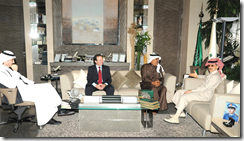Following preliminary discussions with Batelco Group, and a meeting held between Kingdom Holding Company (KHC), chaired by Prince Alwaleed Bin Talal Bin Abdulaziz Alsaud, and Batelco, the two companies announce they have agreed key terms for Batelco to be the telecom operator in a revised bid to acquire 25 per cent stake of Zain Saudi Arabia.
From right to left: Prince Alwaleed Bin Talal AlSaud, Shaikh Hamad Bin Abdulla Al Khalifa, Peter Kaliaropoulos, and Ahmed Halawani
“We are pleased to announce that we reached agreement with Batelco Group to participate in the Kingdom Holding led consortium to acquire 25 per cent of Zain Saudi Arabia,” said Ahmed Halawani, executive director of KHC. "Today we submitted a revised non-binding offer to Zain Group for its 25 per cent stake of Zain Saudi Arabia, valid till 9am on March 14, 2011. Should our offer meet with acceptance from Zain Group board directors, Kingdom Holding looks forward to leading the due diligence phase and negotiating the terms and conditions of the final binding agreement between all parties”.
“We are delighted to have the opportunity to jointly bid and support KHC in its efforts to acquire 25 per cent of Zain Saudi Arabia, as their technical partner,” commented Peter Kaliaropoulos, Batelco Group CEO. We value KHC’s leadership and we look forward to supporting them through an effective technical and business partnership.”
At the end of February Zain Group rejected all three bids for its 25 per cent stake in its Saudi Arabian subsidiary. The bids were submitted separately by Batelco, Kingdom Holding and a consortium led by Al Riyadh Group. The stake is currently valued at around US$750 million.



